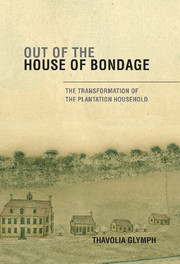Crossref Citations
This Book has been
cited by the following publications. This list is generated based on data provided by Crossref.
Lichtenstein, Alex
2008.
From Personalism to Contractualism: A Review of the Freedmen and Southern Society Project's Latest Documentary History of Emancipation.
The Journal of Peasant Studies,
Vol. 35,
Issue. 4,
p.
636.
Bracey, John H.
2011.
NEW LIGHT ON THE AFRICAN AMERICAN PAST, NEW DIRECTIONS FOR FUTURE RESEARCH.
The Journal of African American History,
Vol. 96,
Issue. 3,
p.
354.
2011.
Fatal Self-Deception.
p.
147.
Wiegman, Robyn
2011.
The Lesbian Premodern.
p.
203.
Jones, Martha S.
2011.
Time, Space, and Jurisdiction in Atlantic World Slavery: The Volunbrun Household in Gradual Emancipation New York.
Law and History Review,
Vol. 29,
Issue. 4,
p.
1031.
Fraser, Rebecca J.
2013.
Gender, Race and Family in Nineteenth Century America.
p.
1.
Bell, Richard
2013.
The Great Jugular Vein of Slavery: New Histories of the Domestic Slave Trade.
History Compass,
Vol. 11,
Issue. 12,
p.
1150.
Small, Stephen
2013.
Still Back of the Big House: Slave Cabins and Slavery in Southern Heritage Tourism.
Tourism Geographies,
Vol. 15,
Issue. 3,
p.
405.
Rodrigue, John C.
2014.
A Companion to the U.S. Civil War.
p.
1121.
2014.
African American Voices.
p.
8.
Martinez, Jaime Amanda
2014.
A Companion to the U.S. Civil War.
p.
949.
Vigna, Xavier
and
Zancarini-Fournel, Michelle
2014.
Editorial.
Clio,
Hughes, Claretha
2014.
American Black Women and Interpersonal Leadership Styles.
Vol. 103,
Issue. ,
p.
19.
Sternhell, Yael A.
2014.
A Companion to the U.S. Civil War.
p.
965.
Ralph, Michael
2015.
Theoretical Ramifications of Django Unchained.
American Anthropologist,
Vol. 117,
Issue. 1,
p.
154.
Auyero, Javier
and
Kilanski, Kristine
2015.
From “making toast” to “splitting apples”: dissecting “care” in the midst of chronic violence.
Theory and Society,
Vol. 44,
Issue. 5,
p.
393.
Foner, Eric
2015.
ERIC FONER'S “RECONSTRUCTION” AT TWENTY-FIVE.
The Journal of the Gilded Age and Progressive Era,
Vol. 14,
Issue. 1,
p.
13.
2015.
Making Freedom.
p.
199.
Balfour, Lawrie
2015.
Ida B. Wells and “Color Line Justice”: Rethinking Reparations in Feminist Terms.
Perspectives on Politics,
Vol. 13,
Issue. 3,
p.
680.
2015.
Troubling Freedom.
p.
287.





